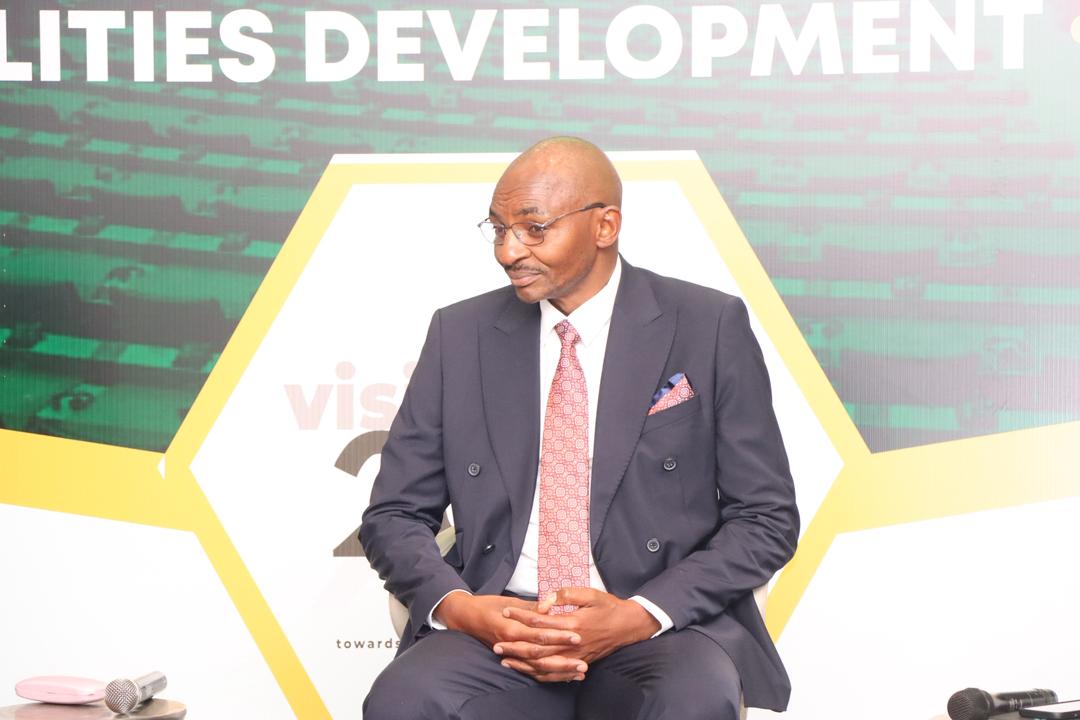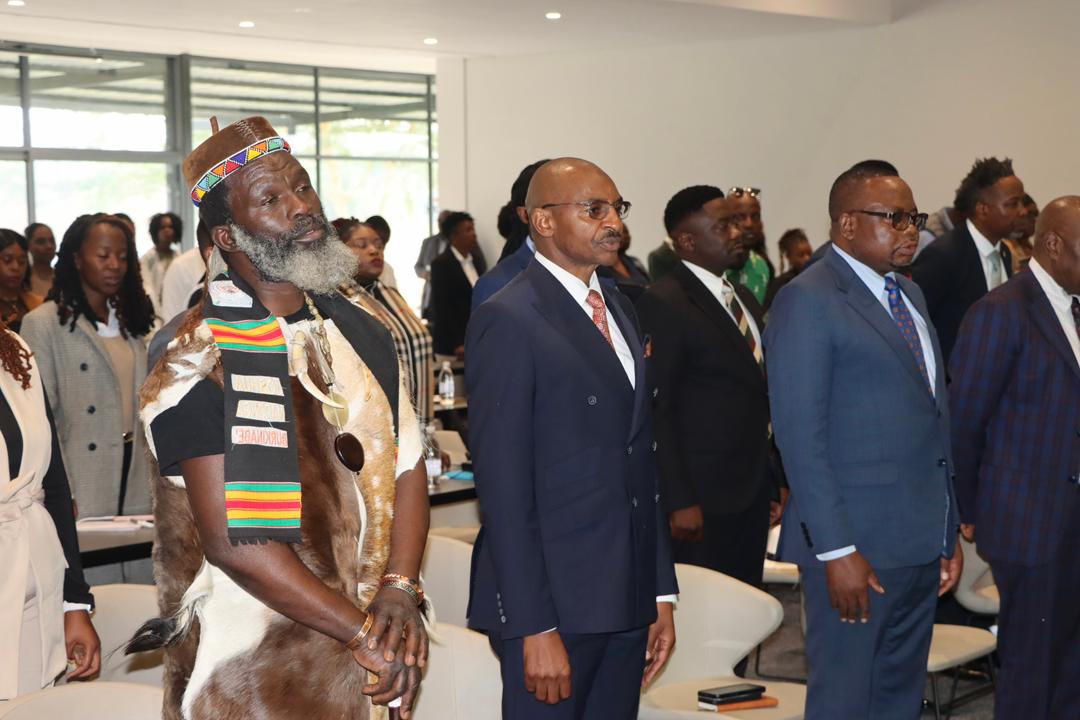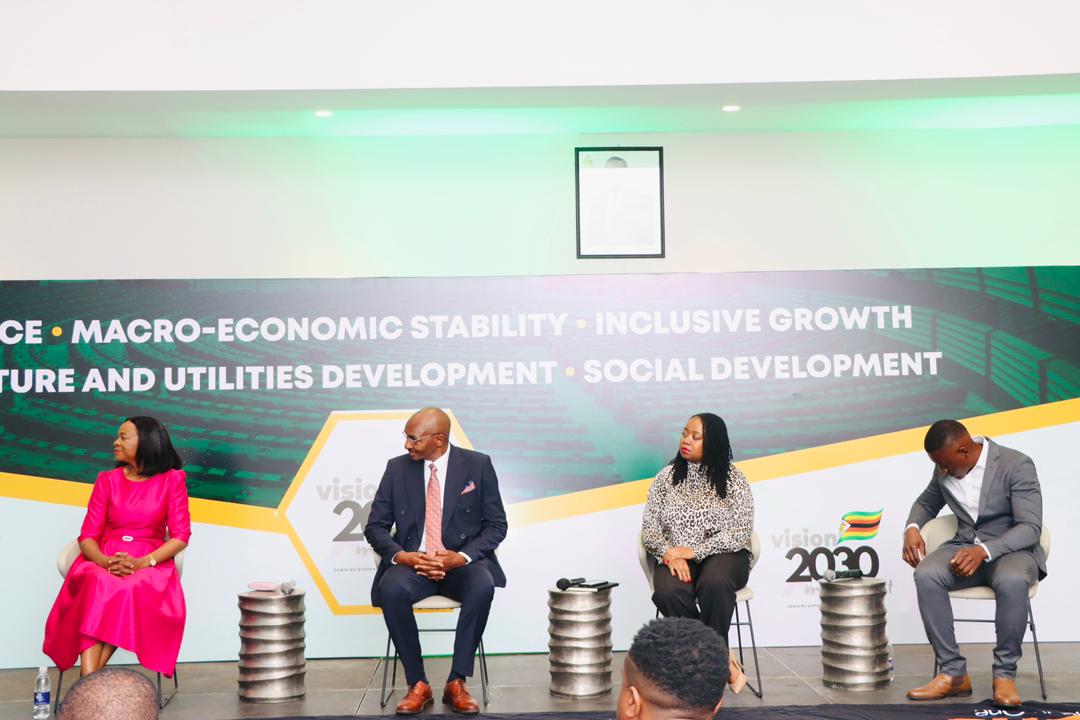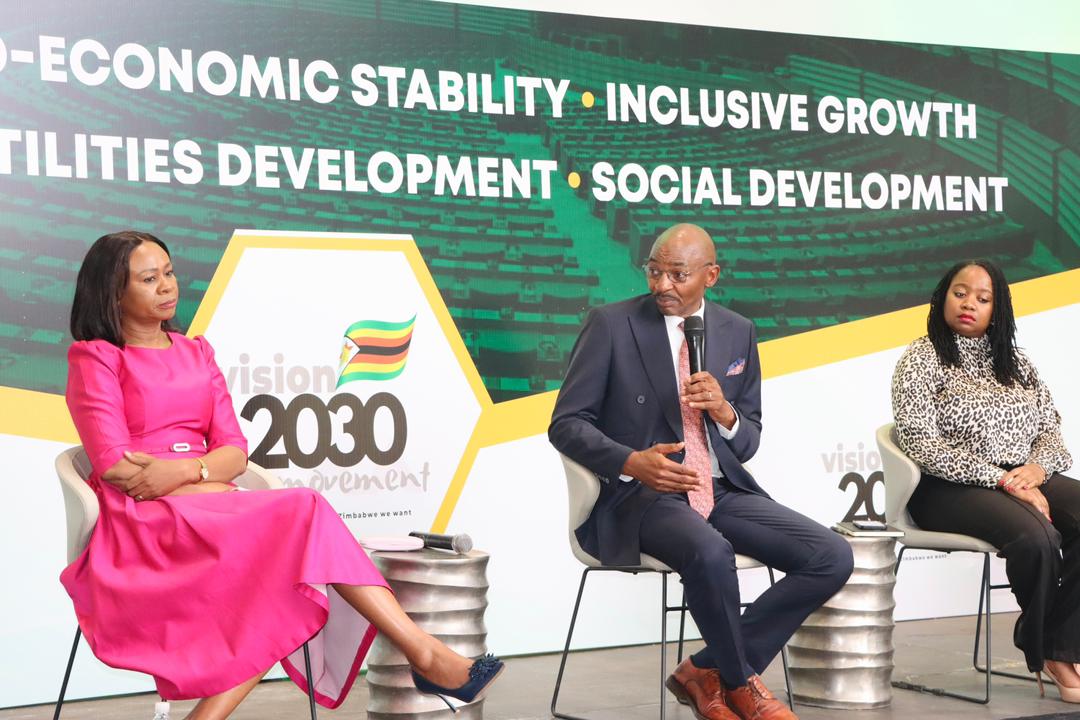Current Affairs
NetOne CEO Highlights Role of Youth in Driving Zimbabwe’s Digital Revolution

NetOne Group Chief Executive Officer, Engineer Raphael Mushanawani, has reaffirmed the organisation’s commitment to driving Zimbabwe’s digital transformation agenda, saying the telecoms giant stands ready to connect generations and empower the nation’s youth as the country moves toward Vision 2030.
Speaking at the Vision 2030 Intergenerational Dialogue Summit, held at Newlands Country Club on 12 November 2025, Eng. Mushanawani said the convergence of technology, skills, and innovation is redefining Zimbabwe’s development path under the leadership of His Excellency, President Dr. Emmerson Dambudzo Mnangagwa.
The summit, attended by senior Government officials, diplomats, development partners, industry leaders and the youth fraternity, explored how collaboration across generations can accelerate socio-economic transformation.
Eng. Mushanawani said Zimbabwe is at a turning point, with digitalisation opening vast opportunities for young people. He emphasised that NetOne is not only a telecommunications operator but a national enabler facilitating access to education, enterprise, innovation, and essential services.

“We are deploying the foundation of digital infrastructure that will carry the next generation into the future they deserve. The youth of today are the leaders of our digital tomorrow,” he said.
Intergenerational Dialogue Through Technology
The NetOne CEO said the summit’s theme, intergenerational dialogue, aligns perfectly with the company’s mission to bridge Zimbabwe’s age, skill and knowledge divide.
He stressed that technology should enhance unity between generations rather than create a gap.
“The older generation brings wisdom and institutional memory; the younger generation brings innovation and agility. Our responsibility is to create the digital bridges that make this exchange seamless, productive, and sustainable,” he said.
Youth Empowerment at the Core
Eng. Mushanawani outlined NetOne’s robust efforts to empower young people through digital skills development.

The company is partnering with tertiary institutions, vocational training centres, and innovation hubs to groom young software developers, data scientists, and problem-solvers who will shape Zimbabwe’s participation in the Fourth Industrial Revolution.
He emphasized that NetOne is “catching them young,” ensuring that students equipped with technology today become digital contributors tomorrow.
Technology with a Human Face
The CEO noted that while technology drives progress, its ultimate purpose is to improve lives.
NetOne is playing a key role in national campaigns promoting responsible digital citizenship and fighting drug and substance abuse among youths.
“Technology must serve humanity, not replace it. It must uplift, not isolate,” he said.
Smart Agriculture and Smart Mining Initiatives
Highlighting NetOne’s impact across various sectors, Eng. Mushanawani said the company’s digital platforms are transforming agriculture and mining—two pillars of Zimbabwe’s economy.

In Smart Agriculture, young farmers now access real-time weather updates, land-use data, and digital mapping tools to guide farming decisions and boost productivity.
In Smart Mining, digital tools such as electronic surveying and online claim management are empowering young miners to operate responsibly and efficiently.
Touching Lives Through Connectivity
Eng. Mushanawani said NetOne measures success through the real human impact of its services.
Whether it’s a rural student accessing e-learning, a farmer receiving weather alerts, or a clinic consulting specialists remotely, every connection represents a life changed.
Collaboration, Not Competition
The NetOne CEO also acknowledged the contributions of other ICT players, both local and international, who share the same goal of advancing Zimbabwe’s digital future.

He highlighted the importance of collaboration within the digital ecosystem, especially with global Low Earth Orbit (LEO) satellite partners enhancing rural connectivity.
Advancing Towards Vision 2030
As Zimbabwe shifts into NDS2 and intensifies efforts toward becoming an upper-middle-income society by 2030, Eng. Mushanawani pledged that NetOne will continue investing in digital infrastructure, skills development, and inclusive connectivity.
“We are building the future under the leadership of President Mnangagwa, one connection, one skill, and one empowered young person at a time,” he added.
A Bridge Between Generations
He concluded by noting that intergenerational dialogue is not only about exchanging ideas but also sharing responsibility for nation-building.
NetOne, he said, stands as a bridge between past wisdom and future innovation, powering progress and touching lives daily.
Current Affairs
Minister Rwodzi Charts Path as Sector Takes Lead in GDP Growth

Itai Mazire
Tourism and Hospitality Industry Minister Barbara Rwodzi has implored players in the sector to embrace innovation, sustainability, and stronger partnerships to safeguard Zimbabwe’s tourism gains, as the industry now leads national GDP growth ahead of mining and agriculture.
In a speech delivered on her behalf by Tourism Permanent Secretary Dr. Takaruza Munyanyiwa at the Hospitality Association of Zimbabwe (HAZ) Summit and Annual General Meeting in Harare today, Minister Rwodzi said the country stood at a “historic crossroads” following its recent listing by Forbes as the best destination to visit in 2025.
“This is a well-deserved accolade which we should celebrate and sustain going forward. Congratulations, makorokoto, amhlope to the service providers of the tourism and hospitality industry of Zimbabwe.”
The Minister applauded the sector’s resilience in the face of pandemics, economic headwinds, and climate-related shocks, noting that the spirit of Zimbabwean hospitality remains unbroken.
“We have continued to smile, to serve, and to tell our authentic story, hence reaping the rewards now,” she said.
Giving an update on performance, Minister Rwodzi reported that international tourist arrivals grew by 9 percent between January and September 2025 compared to the same period last year, with strong traffic from the Americas, Africa, and Asia.
Domestic travel also surged by 20.9 percent over the same period, while the sector generated approximately USD 922 million in 2025 a 10 percent rise from the USD 839 million recorded last year.
“These are encouraging signs that our recovery is gaining positive traction. But future-proofing requires more than recovery it demands transformation,” she said.
Minister Rwodzi outlined five pillars she said would anchor the transformation of the sector: digitalisation; sustainable and climate-resilient tourism; human capital development; infrastructure and connectivity; and stronger branding and market diversification.
“The future of hospitality is digital,” she said. “We must move from brochures to big data, from paper-based booking to smart platforms.”
She urged operators to embrace online booking systems, virtual reality tourism aids, and other digital tools that enhance visitor experiences.
On sustainability, Minister Rwodzi said protecting Zimbabwe’s natural and cultural heritage was “not an expense it is an investment in the longevity of our industry.”
The Minister stressed the need to invest in human capital, calling on operators to work closely with academia to bridge skills gaps and develop tomorrow’s hospitality innovators. She highlighted the First Lady, Dr. Auxillia Mnangagwa’s gastronomy vision as a key avenue for elevating Zimbabwe’s culinary offerings.
On infrastructural development across the country, she said it remained central to competitiveness: “A tourist’s journey begins long before they reach our front desk — it begins on a road, a runway, or a mobile network.”
Minister Rwodzi reiterated that Government is committed to creating an enabling environment, pointing to the recent reduction of tourism fees by up to 50 percent to lower operating costs.
“Future-proofing cannot be achieved by Government alone,” she said. “The private sector is the engine of creativity, investment, and service excellence.”
Her call for collaboration was anchored on an African proverb which states that, “Tomorrow belongs to the people who prepare for it today.”
The Minister said the role of HAZ remained critical as Zimbabwe eyes increased international tourist inflows.
“The world’s eyes are turning towards Zimbabwe. We have the assets, we have the people, we have the passion so why not?” she said.
“To HAZ, your role has never been more critical. You are the unified voice of the hospitality industry. Your strength lies in your collective action.”
She said the ongoing summit provided a platform to “strategise, innovate, and build consensus” as the sector pushes towards Vision 2030.
“The potential is vast. The time is now. Let us build not just an industry, but a legacy,” said Minister Rwodzi.
Current Affairs
Apostolic Church Founder Paul Mwazha Dies at 107

Zimbabwe and the wider African Christian community are mourning the loss of Bishop Paul Mwazha, the revered founder of the Apostolic Church in Africa, who passed away today at the remarkable age of 107.
Bishop Mwazha, widely regarded as one of the continent’s most influential religious leaders, dedicated his life to the growth and spiritual guidance of his church, which boasts millions of followers across Zimbabwe and beyond. His teachings, rooted in faith, discipline, and community service, have left an enduring legacy that continues to shape generations.
The Apostolic Church in Africa under his leadership became a cornerstone of spiritual life in many communities, providing not only religious guidance but also social support and education initiatives. Church leaders have called for prayers as they prepare for national and regional mourning rituals.
Further details on funeral arrangements and memorial services are expected to be released in the coming days.
Business
Zimbabwe Bets Big on Biotech to Fuel Industrial Revolution


Dr. Eng. Willie Ganda
By Enia Dube
The Minister of Higher and Tertiary Education, Innovation, Science and Technology Development, Hon. Dr Fredrick Shava, has thrown his weight behind biotechnology as a key driver of the country’s industrialisation and modernisation agenda.
Speaking at the National Biotechnology Authority (NBA) Strategic Planning Workshop in Kadoma, Dr Shava urged the Authority to identify biotechnology-led opportunities that can boost national production and accelerate economic growth.
“Biotechnology serves as a key catalyst for NDS2 implementation, advancing inclusive economic growth, job creation, and sustainable industrial development,” Dr Shava said, emphasising the need to integrate biotechnology into national value chains to unlock a biotechnology-driven economy. He added that this would turn innovation into industry, knowledge into enterprise, and science into jobs.
The NBA has made notable progress in establishing a strong regulatory framework, promoting biotechnology research and commercialisation, and raising public awareness about the sector’s potential. The Authority has successfully commercialised products such as Mapfura wine and Cofsol cough syrup, and has several other biotechnology products in the pipeline.
Incoming NBA Board Chairperson, Professor Idah Sithole-Niang, echoed Dr Shava’s sentiments, emphasising that the Authority’s five-year strategic plan must meaningfully contribute to the attainment of Vision 2030. “This event marks a significant milestone in the Authority’s ongoing efforts to enhance the role of biotechnology in Zimbabwe’s socio-economic development,” she said.
The workshop aimed to realign priorities and resources in response to emerging technologies and global biotechnology trends, and develop a strategic roadmap to strengthen biotechnology as a key driver of Zimbabwe’s socio-economic transformation. The rapidly evolving global biotechnology landscape, including advancements in gene editing, bio-manufacturing, and climate-smart innovations, presents both new opportunities and challenges for Zimbabwe.
“We recognise the pressing need for an inclusive and forward-looking strategic plan that can navigate the complexities of the biotechnology landscape,” Professor Sithole-Niang noted. The workshop was attended by researchers, government officials, and NBA staff, who are optimistic about the potential of biotechnology to drive Zimbabwe’s economic transformation and achieve Vision 2030.
-

 Current Affairs1 week ago
Current Affairs1 week agoOperation restore order
-

 Crime and Courts2 months ago
Crime and Courts2 months agoMasasi High School Abuse Scandal Sparks Public Outcry
-

 Crime and Courts2 months ago
Crime and Courts2 months agoKuwadzana Man Jailed for Reckless Driving and Driving Without a Licence
-

 Current Affairs3 months ago
Current Affairs3 months agoMunhumutapa Day: Zimbabwe’s Newest Public Holiday Set for Annual Observance
-

 Current Affairs4 months ago
Current Affairs4 months agoBreaking: ZIMSEC June 2025 Exam Results Now Available Online
-

 Current Affairs1 month ago
Current Affairs1 month agoBREAKING NEWS: ZANU PF Director General Ezekiel Zabanyana Fired
-

 Current Affairs3 months ago
Current Affairs3 months agoGovernment Bans Tinted Car Windows in Nationwide Crime Crackdown
-

 Current Affairs2 months ago
Current Affairs2 months agoExposed: Harare GynecologistChirume Accused of Negligence, Extortion, and Abuse



